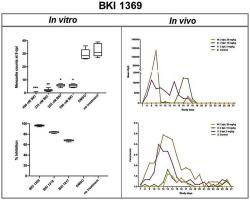International Journal for Parasitology: Drugs and Drug Resistance ( IF 4.1 ) Pub Date : 2020-08-21 , DOI: 10.1016/j.ijpddr.2020.08.005 Aruna Shrestha 1 , Bärbel Ruttkowski 1 , Patricia Greber 1 , Grant R Whitman 2 , Matthew A Hulverson 2 , Ryan Choi 2 , Samantha A Michaels 2 , Kayode K Ojo 2 , Wesley C Van Voorhis 3 , Anja Joachim 1

|
Bumped kinase inhibitors (BKIs) are a new class of antiprotozoal drugs that target calcium-dependent protein kinase 1 (CDPK1) in various apicomplexan parasites. A multiple dose regimen of BKI 1369 has been shown to be highly effective against Cystoisospora suis (syn. Isospora suis), the causative agent of neonatal porcine coccidiosis. However, multiple dosing may not be widely applicable in the field. The present study aimed to determine the efficacy of reduced treatment frequencies with BKI 1369 against porcine cystoisosporosis in vitro and in vivo. Pre-incubation of sporozoites with BKI 1369 completely failed to inhibit the infection in vitro unless treatment was prolonged post-infection. Notably, a single treatment of infected cell cultures 2 days post-infection (dpi) resulted in a significant reduction of merozoite replication. In an experimental infection model, treatment of suckling piglets experimentally infected with C. suis 2 and 4 dpi with 20 mg BKI 1369/kg body weight completely suppressed oocyst excretion. A single treatment on the day of infection or 2 dpi suppressed oocyst excretion in 50% and 82% of the piglets and reduced the quantitative excretion in those that shed oocysts by 95.2% and 98.4%, respectively. Moreover, a significant increase in body weight gain and reduced number of diarrhea days were observed in BKI 1369 treated piglets compared to the control piglets, irrespective of time points and frequencies of treatment. Given that reduced treatment frequencies with BKI 1369 are comparable in efficacy to repeated applications without any adverse effects, this could be considered as a practical therapeutic alternative against porcine cystoisosporosis.
中文翻译:

降低使用颠簸激酶抑制剂 1369 的治疗频率可有效对抗猪囊孢子虫病。
撞击激酶抑制剂 (BKI) 是一类新的抗原生动物药物,其靶向各种顶复体寄生虫中的钙依赖性蛋白激酶 1 (CDPK1)。BKI 1369 的多剂量方案已被证明对猪囊异孢子虫(同义词。猪球虫病的病原体)非常有效。然而,多次给药在该领域可能不广泛适用。本研究旨在确定降低 BKI 1369 治疗频率对体外和体内猪囊孢子菌病的疗效。用 BKI 1369 预培养子孢子完全不能抑制体外感染除非在感染后延长治疗时间。值得注意的是,感染后 2 天 (dpi) 对受感染细胞培养物进行单次处理导致裂殖子复制显着减少。在实验感染模型中,对实验感染猪链球菌的乳仔猪的治疗2 dpi 和 4 dpi 使用 20 mg BKI 1369/kg 体重完全抑制卵囊排泄。感染当天或 2 dpi 的单次处理抑制了 50% 和 82% 仔猪的卵囊排泄,并分别使脱落卵囊的仔猪的排泄量减少了 95.2% 和 98.4%。此外,与对照组仔猪相比,BKI 1369 处理的仔猪的体重增加显着增加,腹泻天数减少,与处理的时间点和频率无关。鉴于 BKI 1369 减少的治疗频率与重复应用的疗效相当,没有任何副作用,这可以被视为一种实用的治疗猪囊孢子虫病的替代方法。











































 京公网安备 11010802027423号
京公网安备 11010802027423号